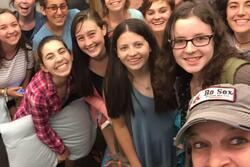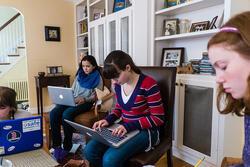Twitter Taught Me How to Love Judaism
When I was in middle school, the only connection I felt to my Judaism was through the beautiful, diverse community that was Jewish Twitter, known colloquially as Jwitter.
Raised in a traditional Orthodox home and attending a just-right-of-modern Orthodox school, my relationship to Judaism as a kid was one of adherence. I followed the guidelines set before me without giving them a second thought. No turning off lights on Shabbat or eating non-kosher food. Saying She’ma when I got into bed and wearing modest clothes (no cap sleeves, no pants). I listened to all of the stories and divrei Torah about God, but I don’t know that I ever really believed. I do know that by the time I was in fifth grade, I was pushing back, asking questions that crossed the line.
In sixth grade, the cracks in my faith became chasms of disconnect. I was filled with frustration and anger as I watched as the treatment of boys and girls become more and more different. Looking back now, I am grateful that my already shaky faith pushed me to the side of feminism rather than a life of internalized misogyny and homophobia. But, because of my budding feminism, I didn’t know if I wanted to remain Jewish. As a twelve year old who had never seen any practice outside of traditional Orthodoxy, I did not know there was a way to be Jewish without compromising my core values. “Denominations” and “nuance” were not words in my vocabulary.
That’s how I found the online community of Jews that fundamentally shifted how I viewed Judaism. In hindsight, it was probably not great for a person just beginning to form opinions and a worldview to join Twitter, a space rife with vitriol and misinformation, but that’s exactly what I did as a deeply lonely and existentially bored preteen.
From Jwitter, I learned that you could be a woman and be learned and be respected. That there are places, even Orthodox ones, where women are not treated as incidental second-class members of the community, but as contributors. Egalitarianism and female rabbis are concepts that I still don’t come across in my day-to-day life, but that are vital to my connection to being part of a Jewish community. People like Avigayil Halpern, an alum of the Rising Voices Fellowship and an openly bisexual rabbi ordained by Hadar, encouraged me to keep learning and to follow my own instincts when interpreting texts.
Jwitter also taught me that you can be queer and Jewish. That Jews can get married to people of the same gender or come out as trans and be tolerated. Or even welcomed with open and loving arms by some groups. That queer Jews have always existed. People from the Tanakh and Talmud, people seen as role models for how to live a Jewish life, have been read as queer by many people before me. Shoshanna Gottlieb, an Orthodox lesbian who posts religiously about both Judaica and pop culture, is someone I still look up to immensely.
Atheist Jews on Jwitter showed me that you don’t have to adhere to standard ideas on God to be Jewish. This helped me reshape how I viewed my place in a Jewish community. I thought I had to figure out exactly where I stood on God, and be either a devout believer maintaining all Orthodox practices or a staunch atheist who left behind the Orthodox world entirely. But then I saw people who followed their own paths. People who were part of the Modern Orthodox community, practiced all the rituals, but just didn’t believe in God. My mind was blown. I didn’t have to compromise either my religion or my authentic thoughts; I could have both.
Since my introduction to these topics thanks to Jwitter, I’ve read articles and books that have expanded my horizons and added complexities to my faith. I know that I couldn’t have gotten to that point without all of the people who showed me that there was more than one way to be Jewish. It’s difficult sometimes, when hearing the phrase “Jewish community,” to think outside of the one you’re familiar with. But learning that there were Jews out there that lived differently than me but were no less Jewish showed me that there are ways to keep my faith and heritage while staying true to myself.
It’s been heartbreaking to watch the vibrant community gradually disappear since Elon Musk’s purchasing of the site. Besides the UI issues and bugs aplenty, Musk’s X has become overrun by neo-Nazis. Where once the comments on posts from Jewish members were filled with lively but ultimately friendly debate, now the top responses are people openly calling for violence against Jewish people. At this point in my life I have built a strong in-person community of Jewish people who I respect and admire, so while this is most certainly a loss for me, I’m not losing everything. It makes me sad to think about all of the people who are in the situation I was in a few years back, now with less access to the community that helped me love being Jewish. I have hope, however, for the resilience of Jewish communities. It won’t be long before there’s new robust online Jewish community.
This piece was written as part of JWA’s Rising Voices Fellowship.







